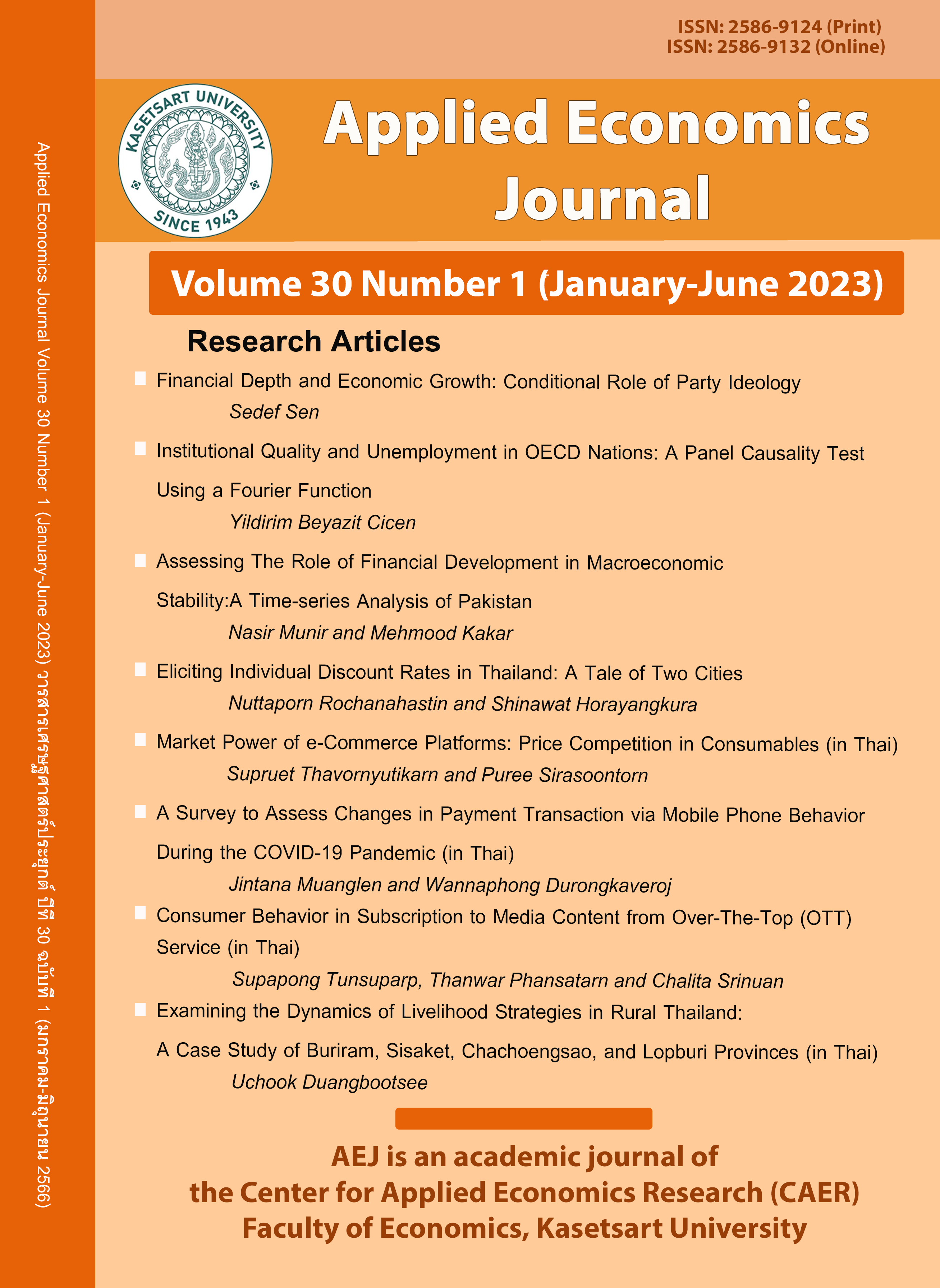Market Power of e-Commerce Platforms: Price Competition in Consumables
Main Article Content
Abstract
It is revealed that e-commerce marketplaces have market power, whereby the prices they offer are far higher than prices offered by physical retail stores. There is a general belief that goods purchased online are cheaper. This paper examines whether such a belief is valid. According to the characteristics of the consumables market, which could be deemed as monopolistic competition, price differences for the same products in different channels should be insignificant due to their high substitutability. Consumables are selected as representatives in this paper’s samples. By collecting 10,080 records of prices and shipping costs from 21 items in seven categories of consumables from the two most popular e-commerce platforms in Thailand – Lazada and Shopee – as well as modern-trade retailers, it is discovered that online prices of those consumables are notably different from their respective retail prices in modern-trade retailers. The results reveal that consumables purchased through e-commerce platforms are different from their respective retail prices, being both higher and lower, although it is possible for consumers to find cheaper prices on such platforms. Taking into account shipping costs, prices that include shipping are significantly higher than prices in retail stores. Moreover, shipping costs are different across platforms. Therefore, such belief is just a myth rather than a fact. It is also found that e-commerce platforms have market power through their abilities to control (1) product visibility (only 14.54 percent of 10,080 samples [or only 1,466 samples] matched the sample products), (2) shipping costs, and (3) consumers’ usage of platforms’ dedicated online applications (applications allow consumers to find cheaper products). Thus, it is imperative to devise suitable regulations on e-commerce platforms. Our findings may support the direction of such regulations in the future.
Article Details

This work is licensed under a Creative Commons Attribution-NonCommercial-NoDerivatives 4.0 International License.
The paper is published under CC BY-NC-ND, in which the article is freely downloaded and shared in its original form non-commercially and its citation details are identified.
References
Agrawal, T. (2023). Monopolistic competition examples. Wall Street Mojo. Retrieved from https://www.wallstreetmojo.com/monopolistic-competition-examples/#h-examples-of-monopolistic-competition
Barkley, A. (2019). The economics of food and agricultural market (2nd edition). Manhattan: New Prairie Press.
Bliss, C. (1988). A theory of retail pricing. Journal of Industrial Economics, 36(4), 375-391.
Cavallo, A. (2017). Are online and offline prices similar? Evidence from large multi-channel retailers. American Economic Review, 107(1), 283-303.
D’Arcy, P., Norman, D., & Shan, S. (2012). Costs and margins in the retail supply chain. Reserve Bank of Australia Bulletin, June Quarter 2012, 13-22.
Electronic Transaction Development Agency (ETDA). (2020). Value of e-Commerce Survey in Thailand 2019. Retrieved from https://www.etda.or.th/th/Useful-Resource/publications/Value-of-e-Commerce-Survey-in-Thailand-2019.aspx (in Thai)
Hunt, S.D. (2011). The theory of monopolistic competition, marketing’s intellectual history, and the product differentiation versus market segmentation controversy. Journal of Macromarketing, 31(1), 73-84.
Kemp, S. (2020, 18 February). Digital 2020: Thailand, retrieved from https://datareportal.com/reports/digital-2020-thailand
Khemani, R.S., & Shapiro, D.M. (1993). Glossary of industrial organisation economics and competition law. Paris: OECD. Retrieved from http://www.oecd.org/dataoecd/8/61/2376087.pdf
Landes, M. & Posner, R. (1981). Market power in antitrust cases. Harvard Law Review, 94(5), 937-996.
Li, Y. & Shaui, J. (2019). Monopolistic competition, price discrimination, and welfare. Economics Letters, 174, 114-117.
Mitra, S. (2022). Economic models of price competition between traditional and online retailing under showrooming. Decision, 49(1), 29-63.
Nakamura, E. (2008). Pass-through in retail and wholesale (NBER Working Paper No. 13965). Retrieved from http://www.nber.org/papers/w13965
Pleatsikas, C. (2018). Perfect competition. In M. Augier & D. Teece (Eds.), The Palgrave Encyclopedia of Strategic Management (pp. 1272-1275). London: Palgrave Macmillan.
RISE (2020). Perspective on Thailand digital ecosystem. Retrieved from https://www.boi.go.th/upload/content/Perspective%20on%20Thailand%20Digital%20Ecosystem.pdf
Sulcas, A. (2021). What is targeted marketing? Definition, strategies, & examples. Sender. Retrieved from https://www.sender.net/blog/targeted-marketing/
The Balance Editors. (2021, 9 November). Is shopping online really cheaper? The Balance. Retrieved from https://www.thebalance.com/is-shopping-online-really-cheaper-939778
Varghese, J. (2022, 19 April). Is it really cheaper to buy online than visiting a brick-and-mortar store? Gulf News. Retrieved from https://gulfnews.com/your-money/budget-living/is-it-really-cheaper-to-buy-online-than-visiting-a-brick-and-mortar-store-1.1650349757923


